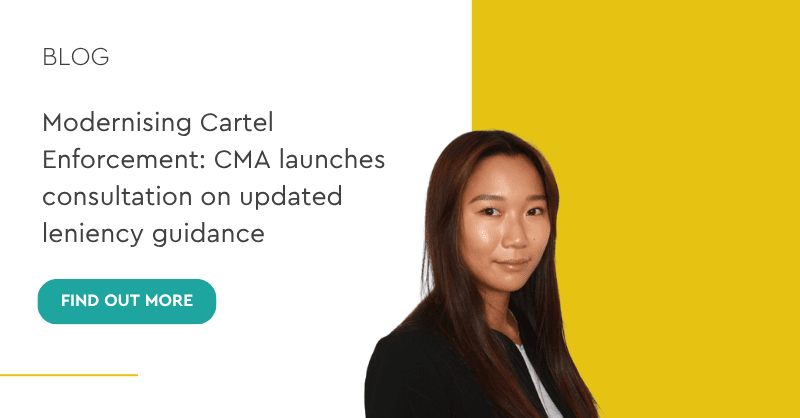
On 29 April 2025, the UK’s Competition and Markets Authority (CMA) published a consultation on proposed revisions to its leniency guidance for cartel cases. The changes are intended to reflect legislative changes, align with current enforcement practices, and enhance the clarity, accessibility, and effectiveness of the CMA’s leniency regime.
The CMA is seeking views on these proposed changes, with the consultation open until Monday, 9 June 2025.
Purpose of the Consultation
The CMA’s leniency policy offers incentives for businesses and individuals to report their involvement in cartel activity (such as price fixing, market sharing and bid rigging) in exchange for immunity or reduced penalties.
The CMA’s leniency guidance was first published in July 2013 and last updated in September 2020. The CMA’s new proposals are intended to ensure its leniency framework remains effective, proportionate, and in step with modern challenges. The CMA states that the changes should provide greater certainty and transparency to potential leniency applicants.
Summary of Key Proposed Changes
- Expanded definition of cartel activity
The guidance now includes additional examples of conduct potentially falling under cartel activity, including:
- No-poach agreements;
- Pay-for-delay arrangements;
- Anti-competitive information exchanges, including through third parties, platforms, a shared algorithm or public announcements;
- Conduct involving sustainability-related restrictions between competitors.
This expanded scope aims to better reflect current CMA practice and recent case law, while retaining flexibility to respond to future developments.
- Revised admission requirements
Under the proposed changes, leniency applicants would not be required to admit participation in cartel activity at the point of application. Instead, such admissions would be required only at the stage of signing a leniency agreement. This adjustment seeks to reduce perceived barriers to early cooperation while ensuring that applicants maintain a genuine intention to cooperate fully with the CMA.
- Changes to the levels of protection for Type B and C applicants
Key revisions include:
- Director disqualification – Automatic immunity from director disqualification will be reserved only to successful corporate and individual Type A immunity recipients. Immunity for type B and C recipients (corporate and individual) will be discretionary only.
- Criminal Cartel Offence – The CMA makes no changes to the blanket immunity granted to Type A immunity recipients, but it clarifies that it will rarely exercise its discretion to grant criminal immunity in Type B and C cases.
- Debarment from public contracts – Immunity from debarment or exclusion from public procurement on competition grounds automatically will be granted to Type A immunity recipients, but Type B or Type C immunity recipients may avoid exclusion or debarment if they can demonstrate that they have conducted ‘self-cleaning’ (i.e. that the circumstances giving rise to the application of the exclusion ground are not continuing nor likely to occur again).
Other changes include:
- Removal of upfront immunity for corporate Type B applicants;
- Clarification that discounts for Type B applicants are unlikely to exceed 75%, and Type C discounts may be significantly lower than 50%;
- Use of SharePoint Online for applications
The CMA seeks to digitise the leniency process by making SharePoint Online the default platform for submitting leniency statements, moving away from the traditional oral process.
- Enhanced guidance for individual applicants
The revised guidance includes dedicated chapters for individual applicants and explains more clearly the processes related to director disqualification, criminal immunity, and cooperation obligations. This is intended to encourage applications from individuals, which the CMA views as a valuable complement to corporate disclosures.
Conclusion
The CMA’s proposed updates to its leniency guidance represent a comprehensive effort to modernise and refine the UK’s approach to cartel enforcement.
The CMA relies heavily on the leniency regime in tackling cartel activity. However, the updated guidance reveals the competing pressures faced by the CMA to encourage self-reporting of cartel conduct, but ensuring it still adequately punishes participation in such activity. The proposed amendments show a heightened reliance on type A leniency applicants and a movement away from subsequent applicants. The proposed amended guidance also shows the CMA’s attempts to grapple with how leniency should interplay with other cartel enforcement tools, such as director disqualification and debarment from public procurement contracts.
The deadline for responses to the Consultation is on Monday 9 June 2025. The CMA will publish their final version of the guidance after the conclusion of the consultation process.
Further information
Should you wish to discuss any of the issues in this article, please contact any of the Kingsley Napley competition litigation specialists.
About the author
Sophie Tang is an Associate in the Criminal Litigation team. Sophie’s practice includes all areas of criminal litigation, with particular expertise in general crime and white collar crime.






